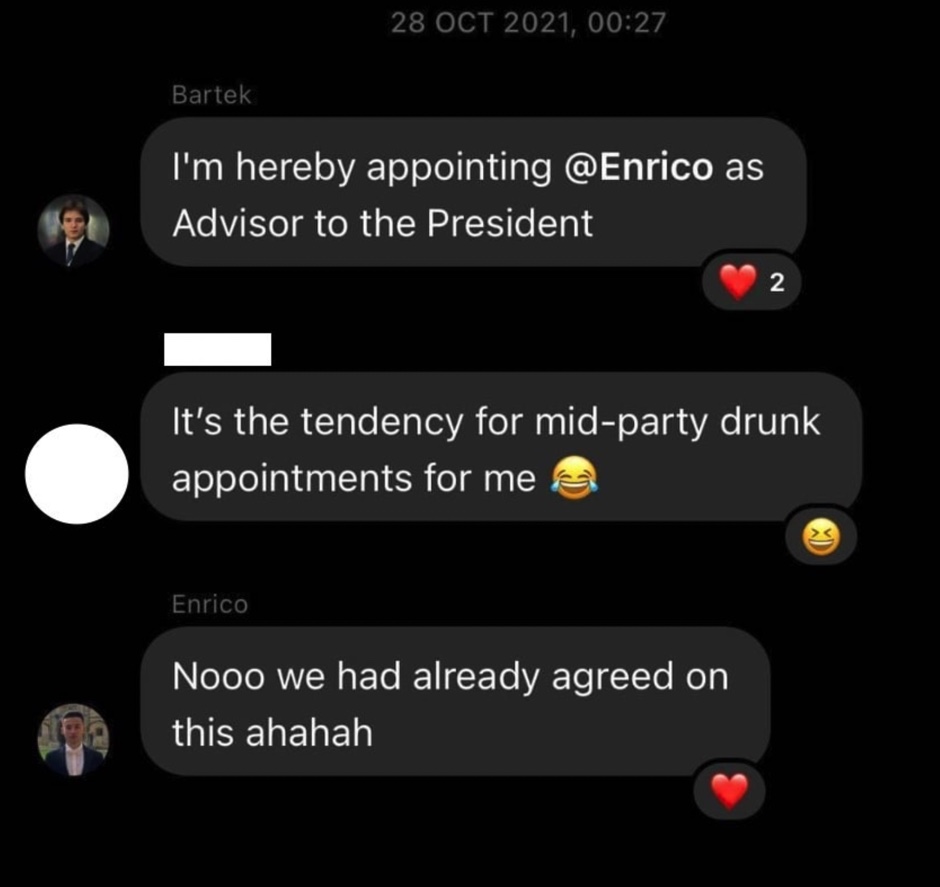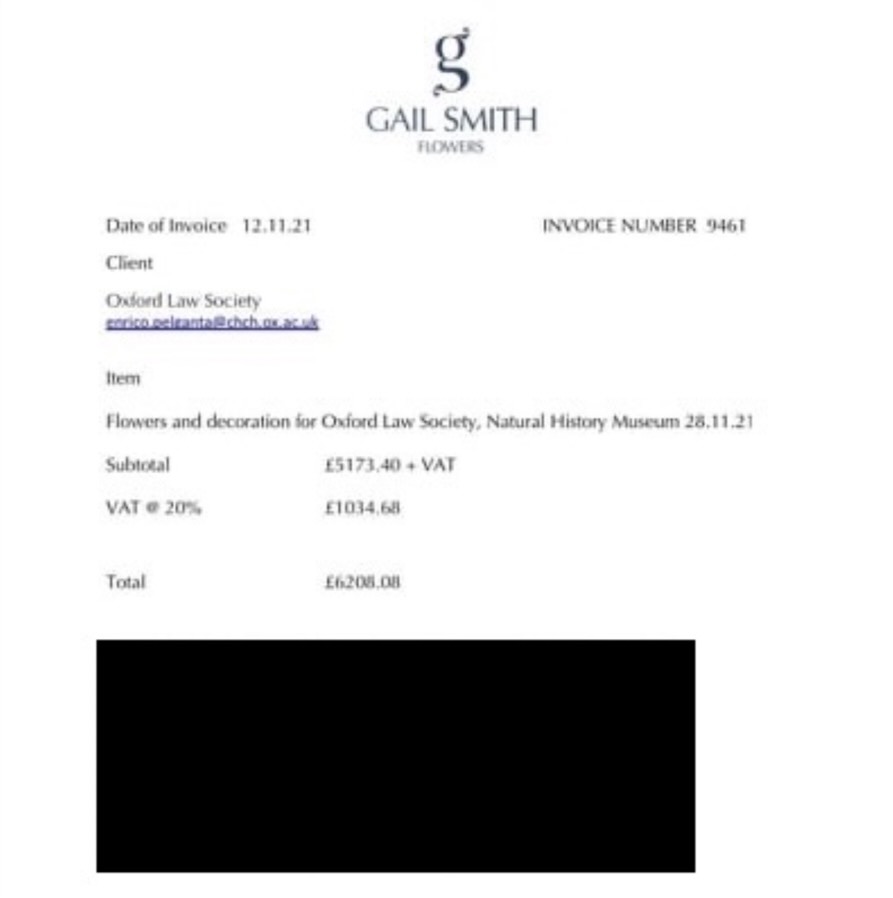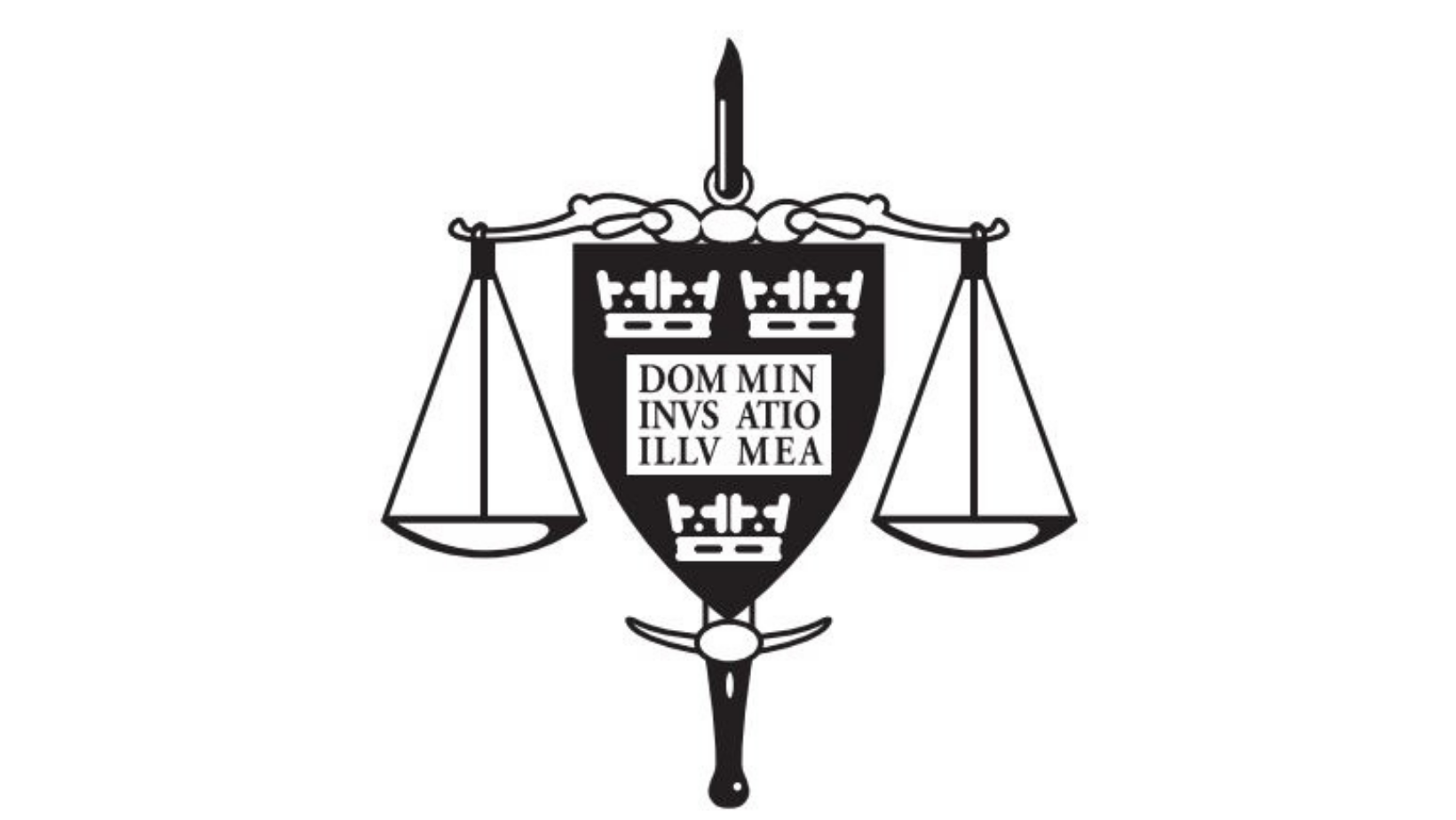Internal communications and financial documents reveal how the Michaelmas Term 2021 Law Society President appointed his friends to influential positions, tried to amend the constitution to allow appointments until graduation, and splashed out on a lavish, cancelled ball. Many hours of conversation with high-ranking members and exclusive access to internal papers paint a picture of a society wracked by power struggles and struggling to administer itself, exacerbated by what members of the executive told Cherwell was a £50,000 loss on the ball cancelled at the end of last term.
The president, of Christ Church, first won election to the presidency in Hilary Term 2021. Serving as president-elect throughout Trinity Term 2021, he became president at the end of that term. The handover was messy; the bank account of the Law Society was still in the name of a long-gone student, leading Lloyds to finally block the issuance of a new card. A new signatory was eventually found in František Ježek, a friend of the President, as the President himself had a non-British phone number which precluded his participation. Ježek had previously resigned in TT21 under the threat of impeachment, as the then President tried removing him for dereliction of duty and misconduct. Ježek told Cherwell, “I had a strenuous [sic] personal relationship with the President TT21, I stepped down for personal reasons and it is entirely misleading to suggest that this was because I felt that I would be impeached and removed.”
The Friends
Ježek was appointed Secretary for MT21. Additionally the role of Treasurer was also filled by Ježek, whom the President had appointed to fill the position in an acting capacity. The position of the Treasurer is an elected one while Ježek had been chosen by the President despite resigning in the previous term. As acting Treasurer and signatory, Ježek had sole control within the society over the bank account which contained the Law Society budget, amounting to tens of thousands of pounds.
This was not the only appointment of close friends. Enrico Pelganta, also of Christ Church and President of the Hayek Society, was another close friend of the President. He had originally been appointed IT officer. This position is necessary to enable further promotion, as other positions require experience on committee. Pelganta told Cherwell, “my appointment as IT Officer was perfectly constitutional. I have gone above and beyond during my involvement with the Law Society: I personally had in several occasions to stretch my capability to ensure the well–running of the society affairs, without any sort of gain from my side.” However, on the 28th of October, at 00:27, the President messaged the executive committee declaring that he was “hereby appointing Enrico advisor to the President”, a role which did not previously exist. Another member of the society responded: “It’s the tendency for mid-party drunk appointments for me [crying laughing emoji].” The President and Pelganta deny that the President was inebriated at the time. Pelganta would later feature in some of the largest expenditures made by the Law Society that term.

The President had now managed to appoint two of his friends to powerful positions within the society. According to the constitution, the Vice-President, which is an elected position, alongside the rest of the committee, can exercise a restraining force. In reality, the Vice-President had resigned, claiming that she could not work with the President and his friends, and the rest of the committee almost never met, despite section 4.1 of the constitution prescribing biweekly gatherings.
By now, the President had almost unfettered control over one of the largest and – crucially – wealthiest student societies. According to one high-ranking member of the executive committee during that term, the President managed to raise over £150,000 from law firms. According to a member who spoke to Cherwell, this was an exceptionally successful round of fundraising. The President also decided to amend the constitution in a way that could have enabled him to assert control over the society for many terms to come.
The Faux pas
The first notice some on the committee received of the Presidents’ attempt to rewrite the constitution was the arrival of the proposed amendments in their inboxes. As President, he had unilaterally commissioned a constitutional review from his associate and fellow student Christopher Collins, and scheduled the meeting for the 14th of November without communicating the amendments until the 13th of November. Collins justified his proposed amendments on the grounds that they would “increase transparency and accountability”.
Cherwell has seen these proposed amendments, which provided for the creation of an Advisory Board, whose members would be appointed by the incumbent executive committee, which at the time was dominated by the President and his friends. This new body, consisting of a Treasurer, a Returning Officer and a Deputy Returning Officer, would be ultimately responsible for the running of the society and its financial affairs. The only term limit imposed on these appointed positions was graduation. The Advisory Board also had the power to overturn the impeachment of any member through an appeals process. This raised the prospect of the President being able to wield considerable influence within the society over a period far in excess of his presidential term. Through friends on the Advisory Board, and with possibly himself as Returning Officer, he could have controlled access to the committee and supervised the discussion on the society’s administrative and financial affairs.
The constitutional amendments also explicitly excluded any appointments not made by the executive committee from forming part of the new body. This meant that the current Returning Officer and HT21 President, Svetoslav ‘Svet’ Karagueorguiev, would not sit on the Advisory Board. However, his successor, appointed by the executive committee, would.
The President told Cherwell that, “upon becoming President, I immediately realised severe structural shortcomings were present in the society. I brought in Mr Collins as an external consultant who had significant relevant experience relating to constitutional matters. Mr Collins acted purely as an advisor and had no decision-making capacity, which was left, as stipulated by the constitution, to members of the committee.”
Cherwell has been told that Collins “expressed reservations” about whether the proposals would be accepted by the committee.
The President’s actions kicked off a brief but messy constitutional crisis. The meeting that the Presiden had called was cancelled by the Returning Officer. Karagueorguiev took this course due to “the complete non-responsiveness from the executive committee about the location of their proposed meeting and their failure to notify of the proposed measures to be discussed”.
Labelling the meeting unconstitutional and citing fears that the short notice would artificially decrease voter turnout, he further directed committee members to “disregard the draft constitutional changes sent out… by Christopher Collins, who is neither a member of the committee nor authorised to advise the Society in any meaningful way.”
The President responded later that day by postponing the meeting in order to “ensure the highest possible turnout and a transparent and fair discussion of the proposed changes”. Somewhat chastened by Karagueorguiev, he stated that “At the same time, I would like to inform you that the “decision” of the Returning Officer, … to cancel the meeting is ultra vires [beyond their authority] as the Constitution does not equip the Returning Officer with the power to make such a ruling, and therefore [sic] ineffective.”
Arista Lai, a former President of the Law Society, waded into the controversy. She expressed concern over the handling of the affair, noting a series of issues with both the scheduling of the meeting and the proposed constitutional changes. Initially, Lai observed that communications concerning the meeting called to discuss the constitutional amendments were not sent out within the required seven days’ notice. In her email to the committee, she then proceeded to pick apart the proposals and the review process.
She wrote “Who is Christopher Collins?… The constitution does not provide for a “consultation” to be unilaterally called by Exec without notifying anybody”. Lai continued, “How can somebody who “never had any formal role within Lawsoc” have any right or capability or knowledge to rewrite our constitution? And if he was advised by Exec, then it is not an independent perspective at all.”
Lai also highlighted the unconstitutional actions of the President, condemning the attempted side-lining of Karagueorguiev, who was the “final interpreter of the constitution”, as well as drawing attention back to Ježek’s appointment, saying he “should not even have been appointed to Exec after having quit (under threat of impeachment) before fulfilling his first and only term on committee”. Labelling the proposal for an Advisory Board as “profoundly undemocratic”, Lai stated that it was the opposite of increasing “transparency and impartiality”. In a similar vein, she said “the proposals… that allow the appointed RO and Treasurer to continue in office for the rest of their student life are entirely ungrounded and would mean that the current Exec who appoint the inaugural Advisory Board will have significant influence, and the Treasurer [Ježek] will have access to Lawsoc funds, for a looooong time.”
Ježek told Cherwell,”I was appointed Secretary based on my past administrative experience and I believe this was entirely appropriate for the president to do. There is no requirement to have served a full term to be Secretary and there is no requirement to not have resigned previously.”
Faced with this criticism, the President climbed down in an email sent the following day. In the email, he disavowed the constitutional changes, encouraging the committee “to disregard the draft that was shared with you”. He apologised for his “conduct” and conceded that “the meeting was rightly and validly cancelled by Svet.” Eventually, that plan was put on hold. But less than two weeks after this internal crisis, the committee would find itself faced with another, public, debacle.
The Flowers
On the 27th of November in Michaelmas Term, 2021, the Law Society sent out an email to ticket holders announcing the cancellation of the termly ball due to be held the very next day. The reason given was ‘major unsurmountable logistical issues.’ These complications are still affecting society today.
A source closely involved with the planning of the ball told Cherwell that despite previously having had difficulties processing payments, the MT21 executive pushed ahead with the event. After they were unable to transfer funds to the ball’s venue, they reached out to Hogan Lovells, the law firm sponsoring the event, the day before the ball. The firm accepted the request that they pay the deposit for the Natural History Museum. A representative from Hogan Lovells clarified that they made this payment on an exceptional basis and did not play a role in any discussions over the cancellation, telling Cherwell: “As in previous years, the firm paid the sponsorship funds directly to the Law Society in good time ahead of the event. The firm was alerted the day before the event that the Law Society were having difficulties in transferring funds to the venue, and required some assistance. The firm kindly offered to step in and paid the sums required directly to the venue. Unfortunately, we were later informed that, due to some administrative hurdles, the event was unable to go ahead despite everyone’s best efforts. We understand that the ball has been rearranged and the firm’s sponsorship funds are being put towards this new event as a continuation of our support.” The last-minute cancellation of the ball, due to what the President has described to Cherwell as “unforeseen circumstances,” lost the society approximately £50,000, a figure confirmed to Cherwell by multiple members of the previous and current executive. It was too late to retrieve many of the deposits made on what was going to be an incredibly lavish ball.

Cherwell has seen an invoice for just one of the lost deposits, from a business called Gail Smith, for a total fee of £6,208.08 invoiced to Pelganta’s account. Gail Smith, it turns out, is a florist.
Over £6,000 in flowers is just one of a variety of transactions that went into the ball’s planning, and various invoices are linked to different members of the society. This is not a unique event; many financial dealings have involved reimbursements to personal accounts from the law society account, complicating the current executive committee’s ability to get an accurate picture of the society’s transaction history – a complex web of personal invoices and large transfers.
After months, would-be ball goers had yet to receive refunds. Oxfesses began to surface, all voicing upset at the cancellation and lack of refunds. On one of these anonymous Oxfesses, which was complaining about both the lack of refunds and the lack of events happening for the first few weeks of Hilary, the current president responded: “I’m sorry about the lack of in-person events, but unfortunately the past Exec has failed to pass ANY financial information onto me, which means I have 0 money to process your refunds or put down deposits for drinks, socials, or other networking events.”
In addition, Scharff-Hansen did not receive a list of students who required refunds until the 2nd of February. This, coupled with the current executive committee’s complete lack of access to the bank account until well into Hilary Term, made the process of refunding students nearly impossible in a timely fashion. Some students are still waiting for refunds.
Causing further frustration, payments for tickets to the ball were not all processed in the same way. Tickets were distributed to Law Society members via QPay, a platform for ticketing on university campuses. While QPay has a convenient refund option, some refunds apparently have not gone through. More notably, some students never bought tickets through QPay at all, but informally via bank transfer directly into the society’s bank account. The list Scharff-Hansen received did not include students who had bought tickets in this way.
Some students have approached the current executive committee to have a refund processed through bank transfer, as they purchased their tickets as ‘a friend of Bartek,’ as one of ‘Bartek’s exec invitees,’ or as a result of being on top of the President’s ‘informal waiting list.’ At this stage, refunds are currently being issued after the temporary standstill in the society’s financial liquidity. The current committee has sent out a google form allowing students to explain how they paid for their ticket, and consequently how they want to be refunded.
The Finances
Both the Michaelmas Term executive and the current executive for Hilary Term have confirmed that the bank account was handed over (albeit in a delayed manner) to the current executive with over £50,000 in it. The signatories on the account include the current vice president of the society, Darian Murray-Griffiths, and former Secretary and acting Treasurer František Ježek.
The official handover was completed by Ježek and Murray-Griffiths on the 30th of January, which fell at the end of week 2 of Hilary Term. In an email explaining this delay, Ježek told Scharff-Hansen, Murray-Griffith, the President, and current President-Elect Geoffrey Cheng, that he had not been seeing messages from Scharff-Hansen in his Facebook Messenger inbox. Cherwell has seen these messages, which date from the 11th of December to the 19th of January, with approximately a dozen messages from Scharff-Hansen left unread by Ježek.
Ježek explained in the handover email, seen by Cherwell, that, in total, he had requested three authentication cards from Lloyds Bank. The first two only arrived after Ježek had already left Oxford at the end of Michaelmas Term, and were rendered invalid by the request of a third card, which arrived in Week 1 of Hilary Term. The PIN arrived early in Week 2. Ultimately, the email emphasised that until the end of Week 2, it was not possible for Ježek to have handed the bank account over earlier.
The lack of funds available to the current executive committee put a cap on not just Michaelmas ball refunds, but also on outstanding fees owed to entertainment companies Merlin Entertainment and Curzon from the Trinity Term ball, which had been postponed to the beginning of Michaelmas term following an extension of COVID-19 restrictions. The society was issued a Level 2 Collection Notice for an outstanding fee of £2,687 from Merlin Entertainment. This type of notice comes after several unsuccessful attempts to settle the outstanding balance. The email, which has been seen by Cherwell, was sent on the 19th of January, which is during Week 1 of Hilary term. When Scharff-Hansen replied explaining that she was unable to pay for a lack of access to the account, Merlin Entertainment responded saying the fee had been settled. A later look at the transaction history revealed that Ježek had paid the amount from the Lloyds account, as he was still active on the account despite no longer having any involvement with the society. Ježek told Cherwell that he intends to be removed as a signatory at the earliest possible time.
The Law Society would pay for expenditures by transferring large reimbursements to personal accounts of committee members; Cherwell found upwards of £20,000 transferred to Ježek’s personal account and £6,000 transferred to Pelganta’s personal account. Cherwell has seen invoices showing that both Ježek and Pelganta have been able to account for the full sums of the transfers, through receipts for ball related transactions, other society events, reimbursements to other students for Law Society related expenses, and money transferred back into the society’s bank account. Ježek told Cherwell that, “the desperate state of lack of access to the bank account meant that we had to rely on emergency measures such as this.”
The transaction history also revealed that £2,172.96 was transferred into the personal account of Christopher Collins, who performed the review of the society’s constitution. Cherwell has seen receipts that prove Collins used the total amount to pay for two Law Society events: Burritos & Mojitos at The Alchemist, and a dinner with a law firm at Malmaison, despite Collins not being involved with the Law Society. Collins said that he was approached by the President after problems with the society’s ‘frozen’ bank account, putting Collins in the ‘uncomfortable position’ of paying for two events.

Scharff-Hansen is currently in touch with a team of accountants who are going through the transaction history looking for any anomalies. If there are any personal transactions that cannot be accounted for, the current executive committee has been encouraged by a representative from the Oxford University Clubs Office to either pursue a civil claim, or contact the police.
Despite this, former President and Returning Officer Svetoslav Karagueorguiev told Cherwell that Scharff-Hansen “has been leading by example and restoring the Society to its former position. Most recently, she is working on all the ball refunds which are in no way her fault and it is a shame she has had her term overshadowed by the negative impacts of the previous administration.” In a response, the MT President told Cherwell that the above “allegations” made to Cherwell “are wholly false and defamatory. They are politically motivated in order to deflect from the incompetence of the current Law Society executive. I, and the former executive of the Oxford Law Society, reserve the right to legal recourse should these false and defamatory allegations be published.”
Image: Oxford Law Society/CC BY-SA 4.0 via Wikimedia Commons



